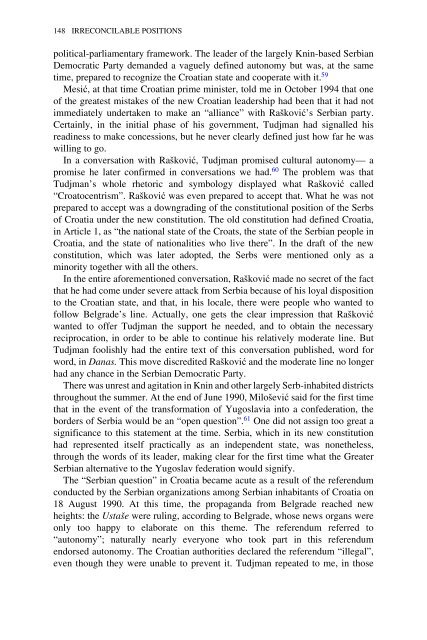Yugoslavia: A History of its Demise - Indymedia
Yugoslavia: A History of its Demise - Indymedia
Yugoslavia: A History of its Demise - Indymedia
Create successful ePaper yourself
Turn your PDF publications into a flip-book with our unique Google optimized e-Paper software.
148 IRRECONCILABLE POSITIONS<br />
political-parliamentary framework. The leader <strong>of</strong> the largely Knin-based Serbian<br />
Democratic Party demanded a vaguely defined autonomy but was, at the same<br />
time, prepared to recognize the Croatian state and cooperate with it. 59<br />
Mesić, at that time Croatian prime minister, told me in October 1994 that one<br />
<strong>of</strong> the greatest mistakes <strong>of</strong> the new Croatian leadership had been that it had not<br />
immediately undertaken to make an “alliance” with Rašković’s Serbian party.<br />
Certainly, in the initial phase <strong>of</strong> his government, Tudjman had signalled his<br />
readiness to make concessions, but he never clearly defined just how far he was<br />
willing to go.<br />
In a conversation with Rašković, Tudjman promised cultural autonomy— a<br />
promise he later confirmed in conversations we had. 60 The problem was that<br />
Tudjman’s whole rhetoric and symbology displayed what Rašković called<br />
“Croatocentrism”. Rašković was even prepared to accept that. What he was not<br />
prepared to accept was a downgrading <strong>of</strong> the constitutional position <strong>of</strong> the Serbs<br />
<strong>of</strong> Croatia under the new constitution. The old constitution had defined Croatia,<br />
in Article 1, as “the national state <strong>of</strong> the Croats, the state <strong>of</strong> the Serbian people in<br />
Croatia, and the state <strong>of</strong> nationalities who live there”. In the draft <strong>of</strong> the new<br />
constitution, which was later adopted, the Serbs were mentioned only as a<br />
minority together with all the others.<br />
In the entire aforementioned conversation, Rašković made no secret <strong>of</strong> the fact<br />
that he had come under severe attack from Serbia because <strong>of</strong> his loyal disposition<br />
to the Croatian state, and that, in his locale, there were people who wanted to<br />
follow Belgrade’s line. Actually, one gets the clear impression that Rašković<br />
wanted to <strong>of</strong>fer Tudjman the support he needed, and to obtain the necessary<br />
reciprocation, in order to be able to continue his relatively moderate line. But<br />
Tudjman foolishly had the entire text <strong>of</strong> this conversation published, word for<br />
word, in Danas. This move discredited Rašković and the moderate line no longer<br />
had any chance in the Serbian Democratic Party.<br />
There was unrest and agitation in Knin and other largely Serb-inhabited districts<br />
throughout the summer. At the end <strong>of</strong> June 1990, Milošević said for the first time<br />
that in the event <strong>of</strong> the transformation <strong>of</strong> <strong>Yugoslavia</strong> into a confederation, the<br />
borders <strong>of</strong> Serbia would be an “open question”. 61 One did not assign too great a<br />
significance to this statement at the time. Serbia, which in <strong>its</strong> new constitution<br />
had represented <strong>its</strong>elf practically as an independent state, was nonetheless,<br />
through the words <strong>of</strong> <strong>its</strong> leader, making clear for the first time what the Greater<br />
Serbian alternative to the Yugoslav federation would signify.<br />
The “Serbian question” in Croatia became acute as a result <strong>of</strong> the referendum<br />
conducted by the Serbian organizations among Serbian inhabitants <strong>of</strong> Croatia on<br />
18 August 1990. At this time, the propaganda from Belgrade reached new<br />
heights: the Ustaše were ruling, according to Belgrade, whose news organs were<br />
only too happy to elaborate on this theme. The referendum referred to<br />
“autonomy”; naturally nearly everyone who took part in this referendum<br />
endorsed autonomy. The Croatian authorities declared the referendum “illegal”,<br />
even though they were unable to prevent it. Tudjman repeated to me, in those
















